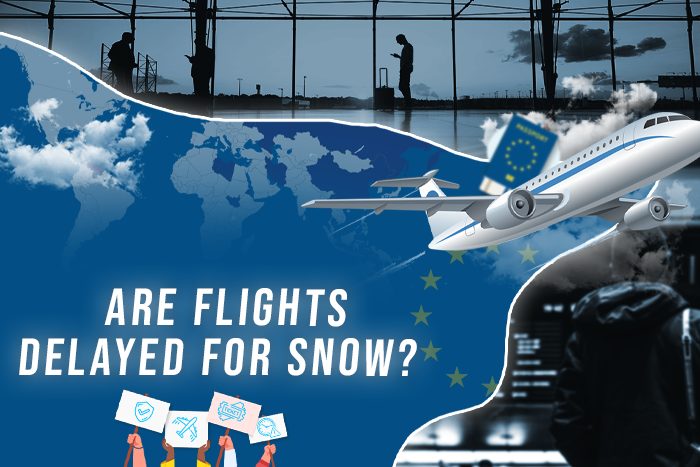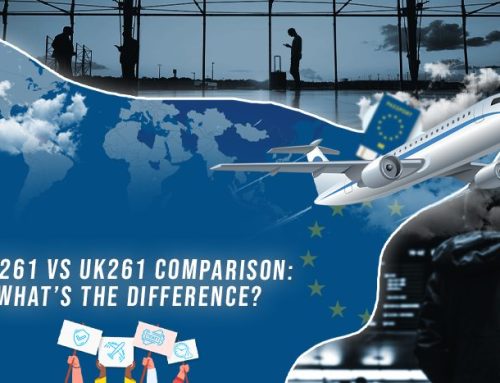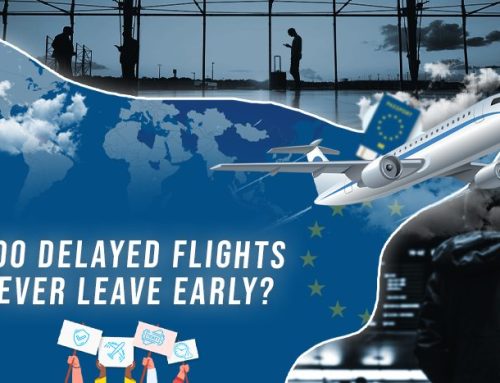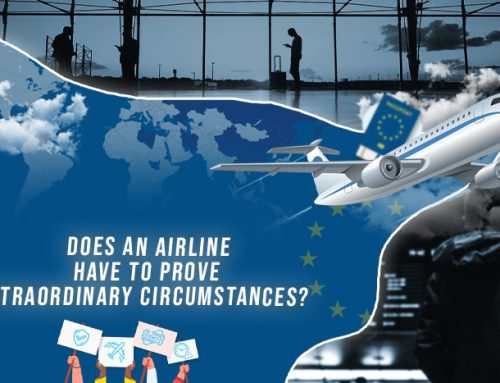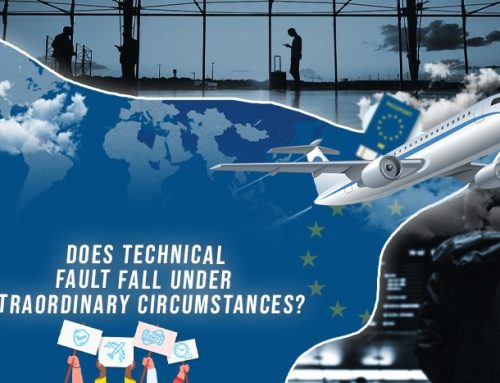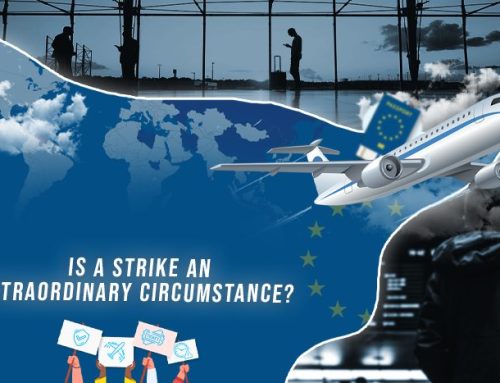Snowfall is wonderful but when it comes to air travel, it might put the flight at risk, delay it, or even cancel it in certain situations.
Snowstorms limit the pilot’s sight. This could risk the lives of many people on board; therefore, airlines don’t allow aircrafts to take off during snow.
This article will provide you with information about flight delays and cancellations due to snow. We’ll tackle questions such as: ‘What should you do?’, ‘What the airline is legally obliged to do?’, and ‘Whether or not you are entitled to any compensation?’
Key Takeaways
- Flights can get delayed or cancelled due to snow, even if the weather outside seems fine. This is because the snowstorm may be happening along the flight’s route or destination, or high winds can provoke the snow and affect the pilot’s vision and control.
- Airlines have adopted methods and protocols to ensure flight safety during snowfall, including plowing and de-icing runways and aircraft. However, delays and cancellations can still occur in dire circumstances.
- Passengers are usually not entitled to compensation for flight delays or cancellations due to extraordinary circumstances like snow. However, airlines will typically rebook passengers for the next available flight and may offer food coupons or free accommodation.
- While snow can be a factor in flight delays and cancellations, it is not the only reason. Other factors such as the pilot’s limited vision or high winds can also affect air travel.
- Passengers who experience flight delays or cancellations for reasons other than snow may be entitled to compensation. They can seek help from companies that specialize in flight delay compensation.
Why Do Flights Get Delayed Or Cancelled Due To Snow?
During a snowstorm, it is likely that your flight might get cancelled or delayed.
Sometimes the airline notifies that your flight will be delayed or is cancelled due to heavy snow but the weather outside is perfect. Such delays often happen because the snowstorm, while not outside, is happening anywhere on the flight’s route or its destination.
Even if there is no snowfall, high winds can provoke the sitting snow which limits the pilot’s vision and affects traction, resulting in a delayed or cancelled flight. A familiar concern is that winter storms are followed by strong wind gusts which emerge out of nowhere, making it hard to take off and/or land.
Flights also cancel if ice accumulates on or around the plane due to extremely cold weather. Wings, landing gear, and the front/back of a plane are all frequent and potentially concerning areas. When ice accumulates around these areas, visibility and control are significantly affected.
What Happens If Your Flight Is Delayed Or Cancelled Due To Snow?
Usually when the flight is delayed due to extraordinary situations (something which is not under the airline’s control) you are not entitled to any compensation. The same goes for the cancelled flight. However, the airline will rebook for the next flight that will be available to your destination.
Because snow is uncertain and it takes time to clear off the runway, you may have to wait from several hours to even days.
In such situations, you can ask customer care representatives whether the airline provides food coupons for delayed passengers. Some airlines also offer free accommodation. However, not all airlines do so, nor are they required to by the law. But it’s always useful to, at least, ask.
And even if they’re not providing free accommodation, they might be able to help in booking you a hotel.
Is It Safe For The Aircraft To Take Off During Snow?
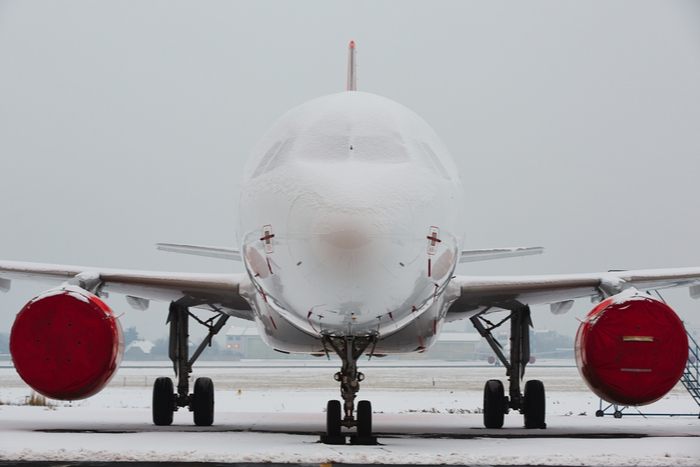
During the winter season, some of the world’s busiest airports, such as those in the United States and Europe, experience a lot of heavy snowfall. In addition, most of the world’s holiday seasons come in the winters.
It’s one of the busiest times for airports and airlines cannot reduce air traffic throughout the winters.
In view of that, authorities and airlines have adopted methods and protocols to ensure flight safety during snowfall to facilitate air travel in tough winter weather.
Airport officials normally allow flight operations in snow and ice unless the circumstances are severe. They do, however, take several precautions before allowing an airplane to take off or land. These safeguards include plowing and de-icing runways, along with de-icing aircraft.
Conclusion
It is usually safe for planes to take off or land in the snow because many airlines follow a set of rules before operating flights to ensure safety. But in dire circumstances delays and even cancellations can happen.
However, snowfall is not the only reason why flights are delayed. Flights are also affected due to pilot’s limited vision or high winds provoking the settled snow.
The airline is not obliged to refund delayed and cancelled flights due to snow. They are also not obliged to pay for your accommodation and food while you wait for the delayed flight.
However, if your flight was delayed for some reason other than snow, and you think you are owed compensation for the delay, you can visit this page to find companies that deal with flight delay compensation to help you out.
Frequently Asked Questions
-
Why do flights get delayed or cancelled due to snow?
Snow can limit the pilot’s vision and control, affecting the safety of passengers. Snow can also accumulate on planes, affecting their performance.
-
What happens if my flight is delayed or cancelled due to snow?
Usually, airlines will rebook you for the next available flight, but you may have to wait several hours or even days. You may also be able to ask for food coupons or free accommodation, but this is not guaranteed.
-
Can I get compensation for a delayed or cancelled flight due to snow?
No, if the delay or cancellation is due to extraordinary circumstances like snow, airlines are not legally obligated to provide compensation.
-
Is it safe for planes to take off or land in the snow?
Yes, as long as airports and airlines follow safety protocols such as plowing and de-icing runways and aircraft. However, delays and cancellations can still happen in severe circumstances.
-
Are flights only delayed or cancelled due to snow?
No, flights can also be delayed or cancelled for other reasons such as the pilot’s limited vision or high winds.
